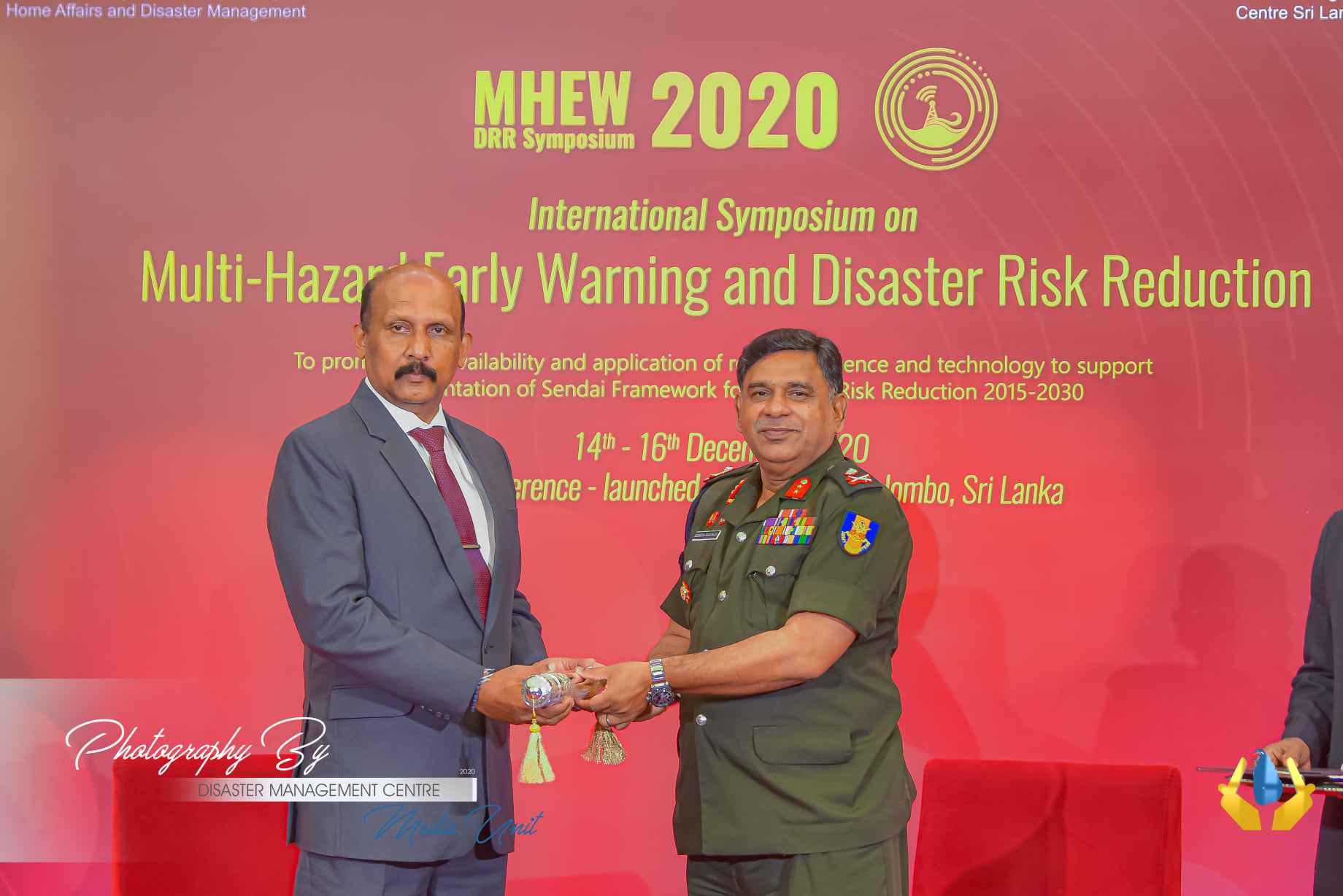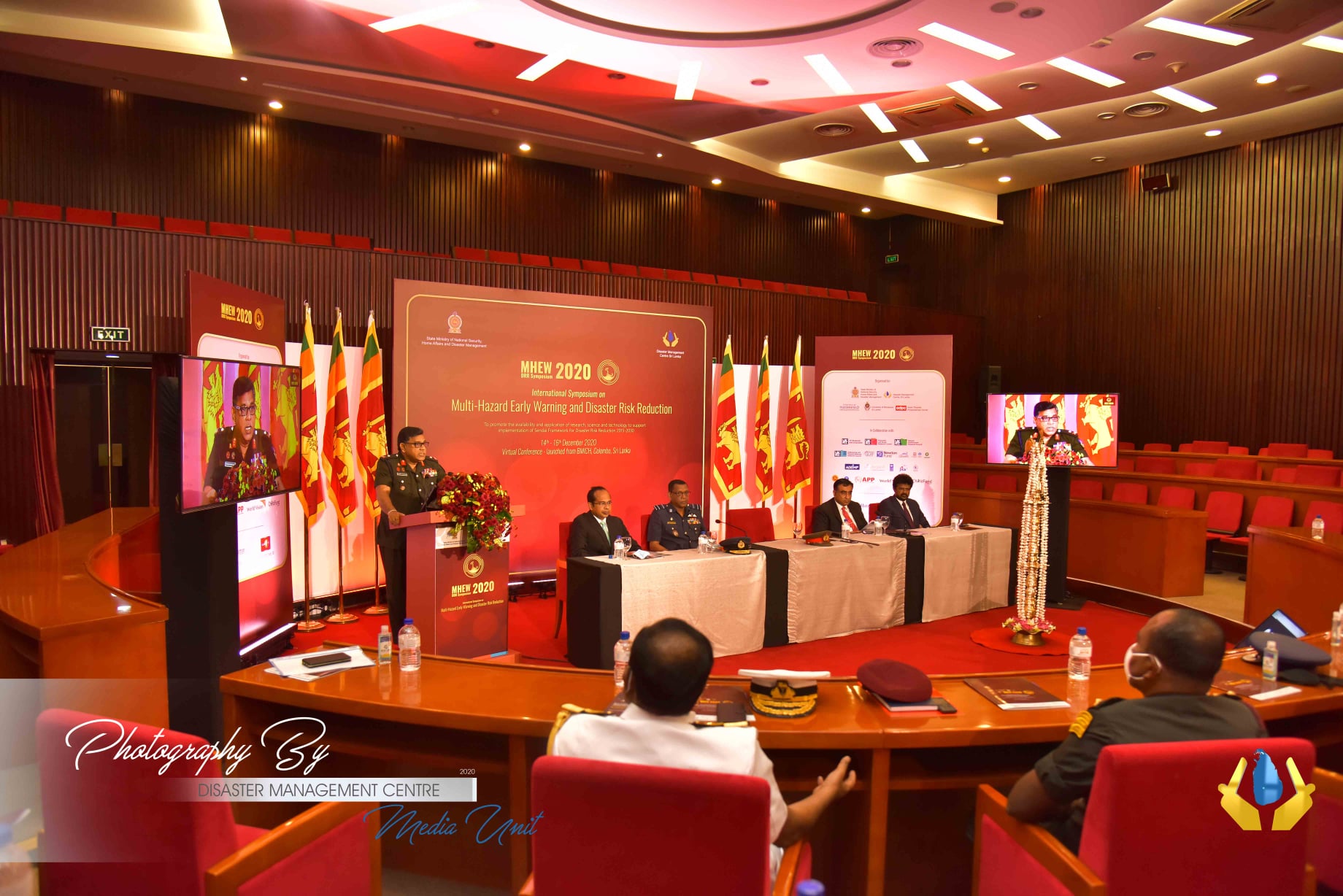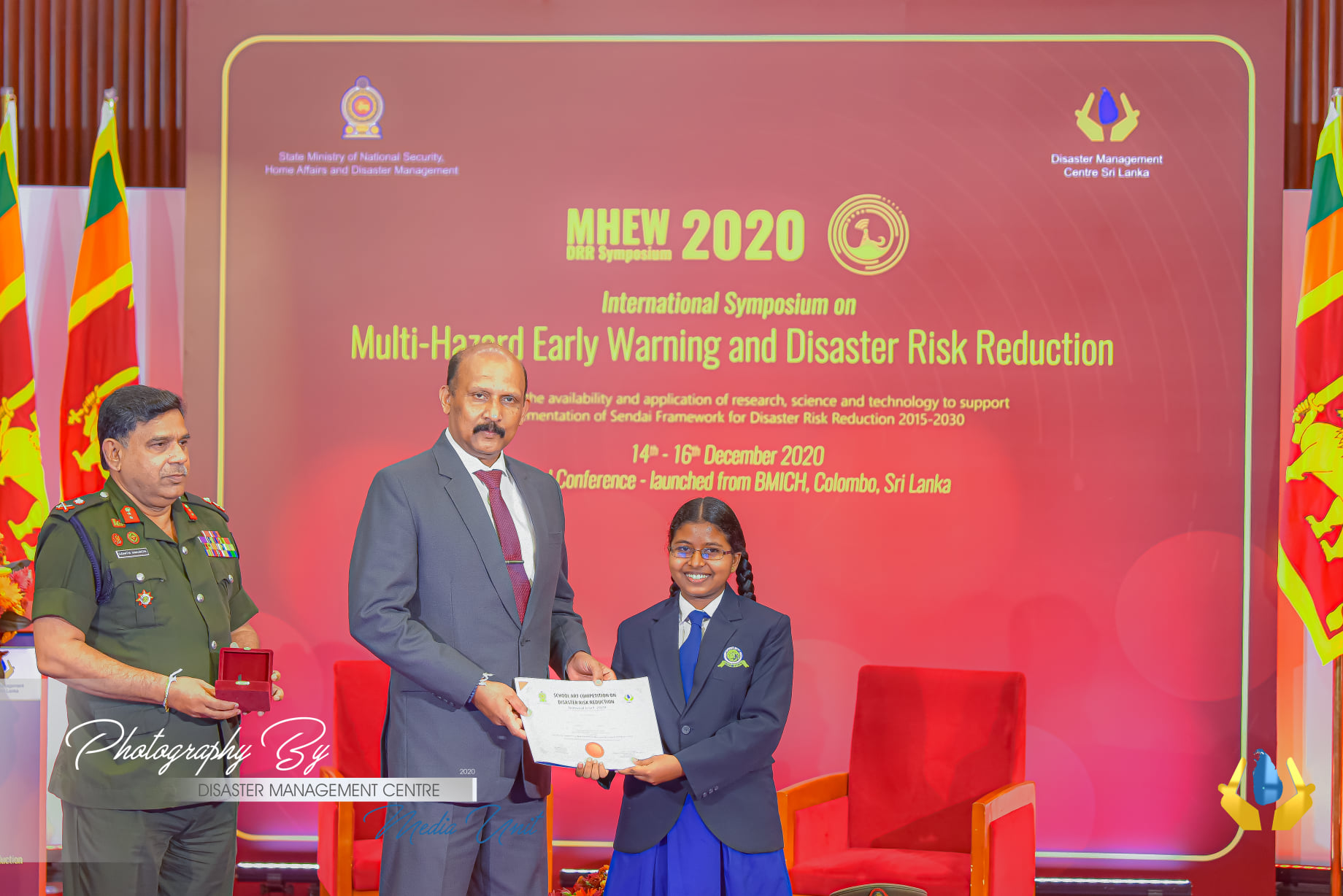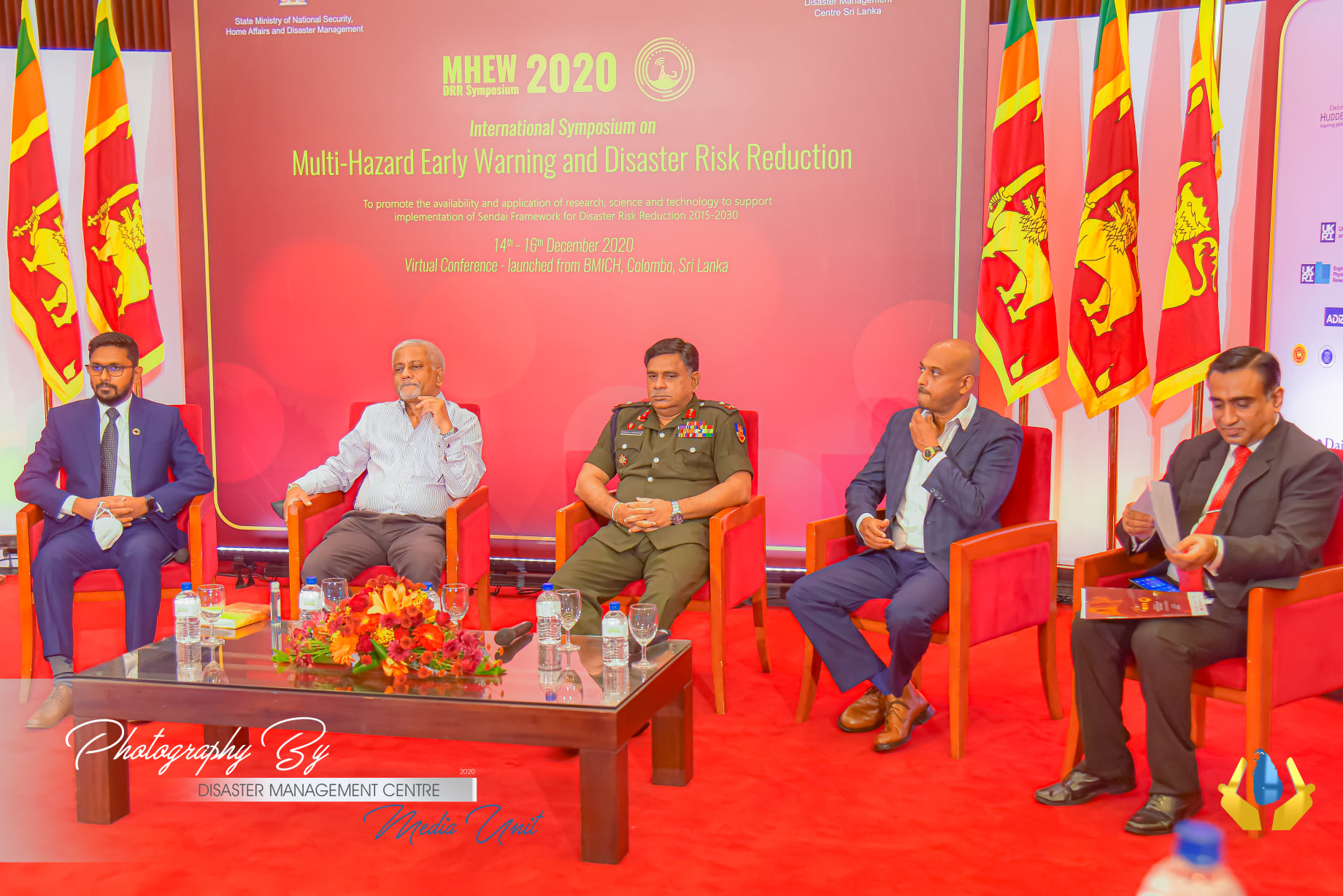 At the culmination of the international symposium on Multi Hazard Early Waning and Disaster Risk Reduction 2020 (MHEW DRR 2020) held on 14th, 15th and 16th at the BMICH, Colombo witnessed the participation of thirty two national, regional and international agencies responsible for tackling disaster risk in Sri Lanka.
At the culmination of the international symposium on Multi Hazard Early Waning and Disaster Risk Reduction 2020 (MHEW DRR 2020) held on 14th, 15th and 16th at the BMICH, Colombo witnessed the participation of thirty two national, regional and international agencies responsible for tackling disaster risk in Sri Lanka.
This three day international symposium held as a hybrid event of face to face and online, brought together over 2,500 participants from the Sri Lankan government, private sector, non-governmental organisations and higher educational institutions on to one common platform. The event was jointly organised by the Disaster Management Centre (DMC), University of Huddersfield in UK, Asian Disaster Preparedness Centre and the University of Moratuwa along with the input and sponsorship from several other partners. The new normal life style amidst the current global pandemic of COVD-19 pave the way for the creation of a virtual platform which was a well-coordinated and successful effort between the whizzes of the two universities and DMC, the host of this international event. Many local and international participants took the advantage of the virtual platform facility and joined remotely.
The participants examined how research, science and technology could be used to support the efforts of the implementation of the Sendai Framework for Disaster Risk Reduction towards 2030. The Symposium programme included a combination of four keynote addresses and five panel discussions which involved leading national and international policy makers and scientists. These were complemented by 20 technical sessions where 157 detailed scientific, policy and practical applications which were presented and shared among the participants.
These wide ranging interventions provided the basis for a Declaration by the Disaster Management Centre, Sri Lanka, together with other key stakeholders responsible for disaster risk reduction in the country, region and beyond, to work together to tackle the priority issues identified and addressed during the symposium.
Commenting on the successful conclusion of this three day event, the Director General of Disaster Management Centre Major General (Retd) Sudantha Ranasinghe said, “This international symposium was conducted at a very critical time amidst a global crisis which is still searching for a permanent solution for the COVID-19 global pandemic. The crisis has taught the world a lesson and it is time we harmonise with the environment and hold Mother Nature supreme. The world continues its life but has put humans in cages”.
Sisira Madurapperuma, representing the Asianre su Disaster Preparedness Centre (ADPC), is enthused by the commitment demonstrated during the event. “Today is a key milestone for the disaster management practice community in Sri Lanka, adopting the Colombo Declaration”. Mr Madurapperuma declared that “we believe this declaration will reshape, rephrase and accelerate the implementation of national strategies, supported by global and regional instruments”.
The declaration expresses deep concern at the growing frequency and intensity of extreme weather and climate related challenges and the continuing impact of disasters, resulting in an unacceptable loss of human lives and livelihoods, displacement of people and environmental and economic damages in Sri Lanka and across the world.
Upon signing the declaration, Professor Dilanthi Amaratunga, based at the Global Disaster Resilience Centre at the University of Huddersfield in the UK, stressed the vital role of science in supporting efforts to tackle disaster risk. “There is an urgent need to strengthen and mainstream the inclusion of research, science and technology applications in Sri Lanka”. She added, “We need to build a community of practice that crosses scientific disciplines and links science, policy and practice. This declaration provides an important step in our roadmap for achieving set policies and protecting people at risk”.
The declaration also recognises the devastating impact of COVID-19 around the world and the threat posed by future epidemics and pandemics. It stresses the need to focus on developing a holistic understanding of societal challenges, risks and drivers, like poverty, climate change, loss of protective eco-systems and biodiversity, rapid urbanisation and unplanned development in hazard prone areas, socio-economic inequalities and population growth along with their interactions. It also underlines the need to build resilience against all hazards, including emerging and unforeseen hazards such as biological, human animal transfer of diseases, hormones and micro plastics.
The declaration sets out fifteen key priorities and actions that must be reflected by stakeholders in order to address these challenges. This bold step taken by DMC, was inspired by the UN Sendai Framework for Disaster Risk Reduction agreed by UN member states in 2015. It includes a strong call for higher education and science to support the understanding of disaster risk and promote risk-informed decisions and risk sensitive planning from the local to the global levels. The goal is to strengthen evidence base approach in support of the implementation of the new framework.
There was also recognition of the need to ensure coherence with other global frameworks such as the UN 2030 Agenda for Sustainable Development, the Paris Agreement on Climate Change and the New Urban Agenda. Fifty four scientific contributions from the conference will also be published in a peer reviewed book, titled: “Multi-Hazard Early Warning and Disaster Risks” [Amaratunga, D., Haigh, R., & Dias N. (Ed.)] to be published by Springer Nature in 2021.
Symposium Book of Abstracts and Proceedings and Colombo Declaration of Multi-Hazard Early Warning and Disaster Risk Reduction: 2020 is available here:
http://cabaret.



more image is available here - www.facebook.com/dmc.gov.lk/photos
Disaster Management Centre join hands with leading local and global experts to improve multi hazard early warning to reduce disaster risk
At the culmination of the international symposium on Multi Hazard Early Waning and Disaster Risk Reduction 2020 (MHEW DRR 2020) held on 14th, 15th and 16th at the BMICH, Colombo witnessed the participation of thirty two national, regional and international agencies responsible for tackling disaster risk in Sri Lanka.
This three day international symposium held as a hybrid event of face to face and online, brought together over 2,500 participants from the Sri Lankan government, private sector, non-governmental organisations and higher educational institutions on to one common platform. The event was jointly organised by the Disaster Management Centre (DMC), University of Huddersfield in UK, Asian Disaster Preparedness Centre and the University of Moratuwa along with the input and sponsorship from several other partners. The new normal life style amidst the current global pandemic of COVD-19 pave the way for the creation of a virtual platform which was a well-coordinated and successful effort between the whizzes of the two universities and DMC, the host of this international event. Many local and international participants took the advantage of the virtual platform facility and joined remotely.
The participants examined how research, science and technology could be used to support the efforts of the implementation of the Sendai Framework for Disaster Risk Reduction towards 2030. The Symposium programme included a combination of four keynote addresses and five panel discussions which involved leading national and international policy makers and scientists. These were complemented by 20 technical sessions where 157 detailed scientific, policy and practical applications which were presented and shared among the participants.
These wide ranging interventions provided the basis for a Declaration by the Disaster Management Centre, Sri Lanka, together with other key stakeholders responsible for disaster risk reduction in the country, region and beyond, to work together to tackle the priority issues identified and addressed during the symposium.
Commenting on the successful conclusion of this three day event, the Director General of Disaster Management Centre Major General (Retd) Sudantha Ranasinghe said, “This international symposium was conducted at a very critical time amidst a global crisis which is still searching for a permanent solution for the COVID-19 global pandemic. The crisis has taught the world a lesson and it is time we harmonise with the environment and hold Mother Nature supreme. The world continues its life but has put humans in cages”.
Sisira Madurapperuma, representing the Asianre su Disaster Preparedness Centre (ADPC), is enthused by the commitment demonstrated during the event. “Today is a key milestone for the disaster management practice community in Sri Lanka, adopting the Colombo Declaration”. Mr Madurapperuma declared that “we believe this declaration will reshape, rephrase and accelerate the implementation of national strategies, supported by global and regional instruments”.
The declaration expresses deep concern at the growing frequency and intensity of extreme weather and climate related challenges and the continuing impact of disasters, resulting in an unacceptable loss of human lives and livelihoods, displacement of people and environmental and economic damages in Sri Lanka and across the world.
Upon signing the declaration, Professor Dilanthi Amaratunga, based at the Global Disaster Resilience Centre at the University of Huddersfield in the UK, stressed the vital role of science in supporting efforts to tackle disaster risk. “There is an urgent need to strengthen and mainstream the inclusion of research, science and technology applications in Sri Lanka”. She added, “We need to build a community of practice that crosses scientific disciplines and links science, policy and practice. This declaration provides an important step in our roadmap for achieving set policies and protecting people at risk”.
The declaration also recognises the devastating impact of COVID-19 around the world and the threat posed by future epidemics and pandemics. It stresses the need to focus on developing a holistic understanding of societal challenges, risks and drivers, like poverty, climate change, loss of protective eco-systems and biodiversity, rapid urbanisation and unplanned development in hazard prone areas, socio-economic inequalities and population growth along with their interactions. It also underlines the need to build resilience against all hazards, including emerging and unforeseen hazards such as biological, human animal transfer of diseases, hormones and micro plastics.
The declaration sets out fifteen key priorities and actions that must be reflected by stakeholders in order to address these challenges. This bold step taken by DMC, was inspired by the UN Sendai Framework for Disaster Risk Reduction agreed by UN member states in 2015. It includes a strong call for higher education and science to support the understanding of disaster risk and promote risk-informed decisions and risk sensitive planning from the local to the global levels. The goal is to strengthen evidence base approach in support of the implementation of the new framework.
There was also recognition of the need to ensure coherence with other global frameworks such as the UN 2030 Agenda for Sustainable Development, the Paris Agreement on Climate Change and the New Urban Agenda. Fifty four scientific contributions from the conference will also be published in a peer reviewed book, titled: “Multi-Hazard Early Warning and Disaster Risks” [Amaratunga, D., Haigh, R., & Dias N. (Ed.)] to be published by Springer Nature in 2021.






